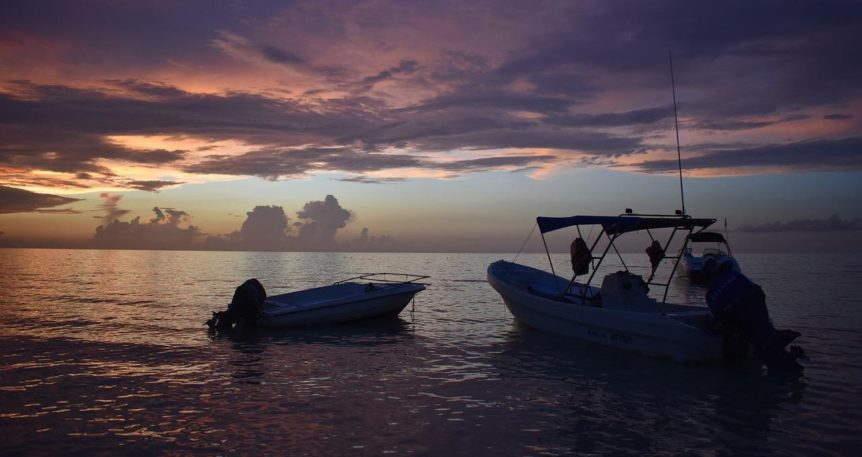Boating is a fantastic activity that you can enjoy with friends of all ages. When you go boating, you can partake in a wide assortment of other activities such as swimming and fishing. However, you cannot ignore the safety of yourself and your passengers because doing so could be dangerous. Boats can travel at lightning-fast speeds meaning a crash would be catastrophic. Boating at night is dangerous because your field of vision will be limited. There is always a risk that something is going to jump out in front of you.
Slow down, ask your friends to help look out for incoming objects, and listen carefully. Use this and the advice provided below to stay safe at night.
Can You Boat At Night?
Boating at night is more difficult than boating during the day. Therefore, you may believe that there are restrictions preventing you from boating after sunset. In most cases, there are not. Typically, you can boat from the sunsets and the sunrises. Still, there may be restrictions in certain areas. For instance, some areas are off-limits for recreational night-time boating. Furthermore, you must make sure that you’re following all navigational rules such as using your lights, carrying adequate safety equipment, and operating slowly.
If you’re caught boating incorrectly at night, there is a risk that you’ll be fined. Alternatively, you may face harsher punishments. Always follow the guidelines so you can enjoy boating at night with your loved ones.
To ensure you have all the safety equipment you need to ensure you and your passengers are safe whilst boating at night, check out our guide on the Ultimate Boat Emergency Kit.
The Differences Between Boating After Dark
When it comes to boating, the experience is going to change significantly after the sun goes down. Since it is going to be dark, your visibility will be limited. It’ll be harder to see incoming boats and other objects in your path. You’ll have to rely on all your sense to ensure that you can avoid potential problems. Boating at night tends to be more dangerous for inexperienced boaters. However, you can boat safely at night if you know what you’re doing.
Follow the recommended guidelines to greatly reduce the risks. Another thing to remember is that some states do not allow PWC or personal watercraft to be used in the middle of the night. If you want to cruise around on your jet ski or wave runner, you’ll have to come back when the sunrises. Regardless, boating at night requires concentration and precision accuracy. One mistake could lead to tragic circumstances.
How To Stay Safe When Boating At Night
Boating at night can be relaxing, but it requires more concentration. If you’re not careful, there is a higher risk that you’re going to experience an accident. Therefore, you should rely heavily on the safety tips below to ensure that your passengers are okay.
Bring Adequate Safety Equipment
Whether you’re boating at night or during the day, you must remember that accidents can happen. Even the most careful boater in the world could experience a problem. Therefore, it is essential to prepare for the worst. The best way to do that is by bringing your safety equipment. You need adequate safety equipment to protect every member of your party. For instance, you should have a lifejacket for each person on the craft. You’ll also need a life ring for every individual. Below, you’ll find a list of items that you need to bring with you to avoid problems.
- Each member of your party needs a life jacket.
- You’ll need a life ring for each person on your craft.
- The number of throwable flotation devices depends, but it is wise to have one for each person.
- Be sure to bring one whistle or horn.
- Each boat needs a ladder.
- A thermal imaging camera is good for nighttime boating.
- Be sure to have a GPS device.
- Boats need documentation, anchor ropes, and lights.
- Don’t forget your anchor, fire extinguisher, and first aid kit.
Besides these items, it is helpful to have more. For instance, you may want to bring a VHF radio, EPIRB, AIS, satellite phone, torchlight, and binoculars. If you think you need something, it is a good idea to bring it. You never know what type of circumstances you’re going to encounter. It is better to be prepared.
Observe Everything
Boating at night tends to be harder because it is more difficult to observe your surroundings. Before you know it, a boat or rock can sneak up on you. If you’re not prepared, there is a risk that you’ll crash into the object in question. Suffice to say, you need to carefully observe your surroundings to avoid potential problems. If you’re boating alone, you’ll have to pay close attention to everything around you. However, it tends to be easier to boat at night with friends because they can help you look out for obstacles.
You’ll have to watch for all obstacles such as rocks, shorelines, other boats, and more. You don’t want to crash into anything since it will be harder to get assistance at night. Tell your friends to help you look for obstacles in your path.
Make Sure You’re Going In The Right Direction
Although it sounds odd, the darkness can make it difficult to maintain the right direction. When you’re boating at night, it is easy to get disoriented. The environment is going to be pitch black. You must use your instruments to guarantee that you’re traveling in the right direction. Thankfully, it is easier to know which direction you’re traveling when you use a chart plotter or radar. You can also use an automatic identification system.
Either way, you must keep a close eye on your direction because it is easier to get disoriented at night.
Don’t Speed
During the day, it is much easier to see the objects in your path. Therefore, you could easily speed without running into issues. Once the sun goes down, you should decrease the speed of your boat. Doing so is highly recommended because it is going to be harder to see what is in your path. If you’re caught speeding at night, there is a chance that you’ll receive a fine. A boat that is a mile away from your craft could cause an accident in a few minutes.
By slowing down, you can greatly reduce the likelihood that you’re going to crash. You’ll give yourself more time to avoid the object in question.
Adapt To The Darkness
You’ve likely found yourself in a dark room at some point. With patience, your eyes will begin adjusting to the darkness. You’re likely not going to see everything, but it is easier to see at night after your eyes have adjusted to the darkness. It is believed that pirates used to wear eyepatches so at least one eye would be accustomed to the dark. When they raided ships at night, they could see in the darkness easier. With this in mind, you should be patient and give your eyes time to adapt to the darkness.
You’ll also need to reduce the light around your boat. Turn off the backlighting on all devices and the cabin lights. It is wise to switch to a flashlight that uses a red filter to preserve your night vision. It can take 20 minutes or so for your eyes to adjust to the darkness.
Listen Carefully
When you decide to go boating at night, you have to use all your sense. During the day, you can get by only using your eyesight. At night, you need to use other senses as well. Doing so can help you identify other boats much sooner. For instance, you should listen carefully. You’ll likely hear a boat’s engine before you see it. In addition to this, you should use your nose. If you smell gasoline in the distance, it could be a boat coming toward you.
Use all your sense to detect boats and other objects so you’ll have plenty of time to act.
Look For Green & Red Lights
You’re likely going to encounter other boats during your trip. You need to know how to handle the encounter. How do you know that the boat is coming toward you or moving away from you? It can be harder to determine at night. However, you can simplify this problem by looking at the lights. The colors can tell you a lot about the boats in your path. Typically, the white light is found at the stern. If you spot green and red lights in front of you, the boat is heading toward you.
If you see a white light, the boat is likely moving away from you. You may stop and wait. If you only see red, the boat might be crossing your boat’s bow. Remember that it has the right of way. Before boating at night, make sure all your vessel’s lights are working.
Summary
Boating at night can be fun once you’ve become comfortable with it. Just remember that the risks are higher because it is harder to see after dark. To minimize the risks, use all your senses, take advantage of your instruments, and get your passengers to help. Use extreme caution to ensure that you make it back without complications.

My name Is Larry Noel, the voice behind BoatCrunch.
I’m a boating enthusiast that loves nothing more than being out on the water. So much so that I’ve acquired a Degree in Marine Biology (MB) as well as a degree in Ocean Engineering (OE).
I’m very familiar with a wide range of different boats and I’ve owned a variety of different boats myself however I have a particular obsession with Pontoon boats. I’ve lived all across the United States and always kept company in the form of boats and now my loving family.

